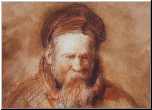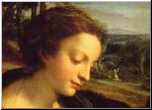PlotinusHow the Secondaries Rise from the First: And on the ONE.(This essay is the fourth tractate of the Fifth Ennead, according to Porphyry's numbering system.) 1. Anything existing after The First must necessarily arise from that First, whether immediately or as tracing back to it through intervenients; there must be an order of secondaries and tertiaries, in which any second is to be referred to The First, any third to the second. Standing before all things, there must exist a Simplex, differing from all its sequel, self-gathered not inter-blended with the forms that rise from it, and yet able in some mode of its own to be present to those others: it must be authentically a unity, not merely something elaborated into unity and so in reality no more than unity's counterfeit; it will debar all telling and knowing except that it may be described as transcending Being -- for if there were nothing outside all alliance and compromise, nothing authentically one, there would be no Source. Untouched by multiplicity, it will be wholly self-sufficing, an absolute First, whereas any not-first demands its earlier, and any non-simplex needs the simplicities within itself as the very foundations of its composite existence. There can be only one such being: if there were another, the two [as indiscernible] would resolve into one, for we are not dealing with two corporal entities. Our One-First is not a body: a body is not simplex and, as a thing of process cannot be a First, the Source cannot be a thing of generation: only a principle outside of body, and utterly untouched by multiplicity, could be The First. Any unity, then, later than The First must be no longer simplex; it can be no more than a unity in diversity. Whence must such a sequent arise? It must be an offspring of The First; for suppose it the product of chance, that First ceases to be the Principle of All. But how does it arise from The First? If The First is perfect, utterly perfect above all, and is the beginning of all power, it must be the most powerful of all that is, and all other powers must act in some partial imitation of it. Now other beings, coming to perfection, are observed to generate; they are unable to remain self-closed; they produce: and this is true not merely of beings endowed with will, but of growing things where there is no will; even lifeless objects impart something of themselves, as far as they may; fire warms, snow chills, drugs have their own outgoing efficacy; all things to the utmost of their power imitate the Source in some operation tending to eternity and to service. How then could the most perfect remain self-set -- the First Good, the Power towards all, how could it grudge or be powerless to give of itself, and how at that would it still be the Source? If things other than itself are to exist, things dependent upon it for their reality, it must produce since there is no other source. And further this engendering principle must be the very highest in worth; and its immediate offspring, its secondary, must be the best of all that follows. 2. If the MIND were the engendering Source, then the engendered secondary, while less perfect than the MIND, would be close to it and similar to it: but since the engendering Source is above the Intellectual-Principle, the secondary can only be that principle. But why is the Intellectual-Principle not the generating source? Because [it is not a self-sufficing simplex]: the Act of the MIND is intellection, which means that, seeing the intellectual object towards which it has turned, it is consummated, so to speak, by that object, being in itself indeterminate like sight [a vague readiness for any and every vision] and determined by the intellectual object. This is why it has been said that "out of the indeterminate dyad and The One arise the Ideas and the numbers": for the dyad is the Intellectual-Principle. Thus it is not a simplex; it is manifold; it exhibits a certain composite quality -- within the Intellectual or divine order, of course -- as the principle that sees the manifold. It is, further, itself simultaneously object and agent of intellection and is on that count also a duality: and it possesses besides another object of intellection in the Order following upon itself. But how can the Intellectual-Principle be a product of the Intellectual Object? In this way: the intellectual object is self-gathered [self-compact] and is not deficient as the seeing and knowing principle must be -- deficient, mean, as needing an object -- it is therefore no unconscious thing: all its content and accompaniment are its possession; it is self-distinguishing throughout; it is the seat of life as of all things; it is, itself, that self-intellection which takes place in eternal repose, that is to say, in a mode other than that of the Intellectual-Principle. But if something comes to being within an entity which in no way looks outside itself -- and especially within a being which is the sum of being -- that entity must be the source of the new thing: stable in its own identity, it produces; but the product is that of an unchanged being: the producer is unchangeably the intellectual object, the product is produced as the Intellectual Act, an Act taking intellection of its source -- the only object that exists for it -- and so becoming Intellectual-Principle, that is to say, becoming another intellectual being, resembling its source, a reproduction and image of that. But how from amid perfect rest can an Act arise? There is in everything the Act of the Essence and the Act going out from the Essence: the first Act is the thing itself in its realized identity, the second Act is an inevitably following outgo from the first, an emanation distinct from the thing itself. Thus even in fire there is the warmth comported by its essential nature and there is the warmth going instantaneously outward from that characterizing heat by the fact that the fire, remaining unchangeably fire, utters the Act native to its essential reality. So it is in the divine also: or rather we have there the earlier form of the double act: the divine remains in its own unchanging being, but from its perfection and from the Act included in its nature there emanates the secondary or issuing Act which -- as the output of a mighty power, the mightiest there is -- attains to Real Being as second to that which stands above all Being. That transcendent was the potentiality of the All; this secondary is the All made actual. And if this is all things, that must be above and outside of all, so, must transcend real being. And again, if that secondary is all things, and if above its multiplicity there is a unity not ranking among those things, once more this unity transcends Real Being and therefore transcends the Intellectual-Principle as well. There is thus something transcending MIND, for we must remember that real being is no corpse, the negation of life and of intellection, but is in fact identical with the Intellectual-Principle. The Intellectual-Principle is not something taking cognizance of things as sensation deals with sense objects existing independently of sense: on the contrary, it actually is the things it knows: the ideas constituting them it has not borrowed: whence could it have taken them? No: it exists here together with the things of the universe, identical with them, making a unity with them; and the collective knowledge [in the divine mind] of the immaterial is the universe of things. Plotinus' Enneads in their entirety are available in the Thriceholy library. The occasional pieces Plotinus wrote during his lifetime were collected by his disciple Porphyry and organized under the principles of number mysticism into sections of nine chapters; thus, the 'Enneads.' Given the circumstances of the Enneads' compilation, readers expecting a relation of consequence between one chapter and the next will, of course, be disappointed: |


